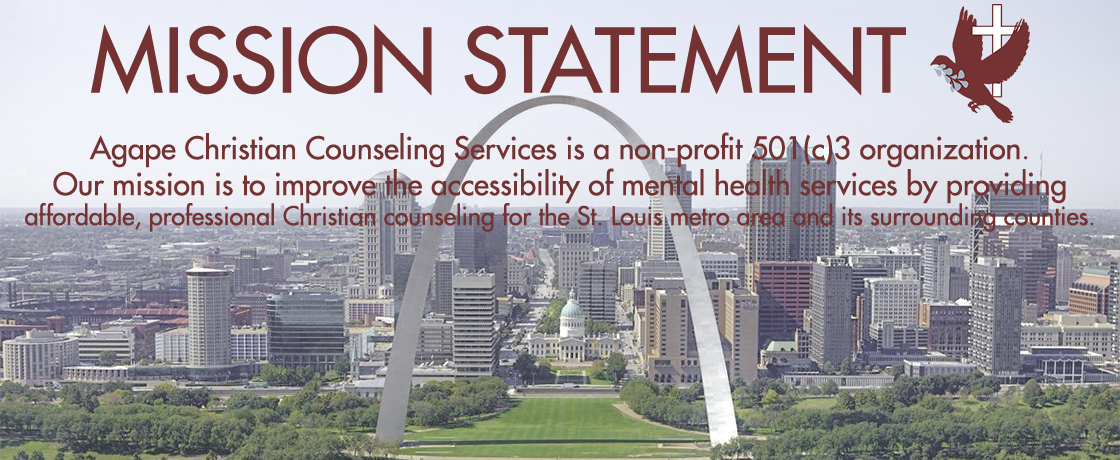About Agape
Our Mission Statement

Agape Christian Counseling Services is a non-profit 501(c)(3) organization. Our mission is to improve the accessibility of mental health services by providing affordable, professional Christian counseling for the St. Louis metro area and its surrounding counties.
Our Approach to Counseling
We believe human behavior is multifactorial. Therefore, counselors at Agape Christian Counseling Services take a holistic approach to counseling, examining the cognitive, behavioral, relational, emotional, Neuropsychobiological, biophysical, family of origin, environmental, circumstantial, past experiences, and spiritual elements that may be driving how they interact and exist within their world. We view our services as a ministry for those who are hurting emotionally. We provide personalized treatment based upon individual needs while also respecting religious and personal values. The client determines when, how, and if biblical principles enter into therapy.
Specialized Training
Agape Counselors seek to provide the best possible care for our clients. Thus, they are active in pursuing additional specialized education and credentialing. Although specializations vary, our counselors are trained and certified in such areas as:
- Gestalt Therapy
- Cognitive-Behavioral Therapy (CBT)
- Eye-Movement Desensitization and Reprocessing (EMDR)
- Trauma
- PTSD
- Suicide Prevention
- Crisis Counseling
- Reactive Attachment Disorder (RAD)
- Certified Sex Therapy (CST)
- Substance use & abuse
- Dialectical Behavioral Therapy (DBT)
- Emotionally Focused Therapy (EFT)
- NeuroLinguistics Programming (NLP)
- Play Therapy
- and others
Common acronyms encountered on our website:
- CIT: Counselor in Training
- LPC: Licensed Professional Counselor
- PLPC: Provisionally Licensed Professional Counselor
- LCPC: Licensed Clinical Professional Counselor
- LCSW: Licensed Clinical Social Worker
- MSW: (Provisionally Licensed) Social Worker
- LMFT: Licensed Marriage & Family Therapist
- MFT: (Provisionally Licensed) Marriage & Family Therapist
- ACA: American Counseling Association
- NCC: National Certified Counselor
- MA: Master of Arts
- MS: Master of Science
- MDiv: Master of Divinity
- MEd: Master of Education
Common Terms, regarding Licensure:
- Under Supervision: this does not mean that someone sits in the room, during the counselor’s sessions. Rather, if a counselor is under supervision, they are required by the state to meet with a licensed supervisor in their field, for a minimum of one hour per week. During supervision meetings, they will discuss their cases, ask questions, and receive additional training. The counselors at this agency who are under supervision typically attend a minimum of two hours supervision on a weekly basis. In addition to that, they attend two Saturday supervision meetings per month. In other words, our supervised counselors received well above the state-required minimum for supervision hours, as we value this time of teaching very much.
- Intern Counselor: the counselor is at the end of their Masters Degree program, but has not yet completed their degree. Part of their degree requirements includes completing a required number of hours conducting counseling sessions with clients, while under supervision.
- Counselor in Training (CIT): the counselor has earned a Masters Degree, but has not yet completed the State Licensure Exam to obtain their Provisional License. They can practice counseling, while under supervision, but cannot accept insurances.
- Provisionally Licensed: the counselor has earned a Masters Degree and has passed the State Licensure Exam. The state requires them to complete a minimum of 5,000 hours + 2 years of counseling experience, while under supervision, before they can apply for “Full Licensure.” (includes PLPC, MFT, MSW, etc)
- Fully Licensed: the counselor has completed all state requirements as a provisionally licensed counselor and the state has approved them to operate without being under supervision. They are still required by the state to complete a minimum amount of Continuing Education Units (CEUs) in order to renew their license, every two years. (includes LPC, LCPC, LMSW, LMFT, etc)
Other Helpful Links:
Monthly Newsletter
Testimonials
Blog
Media
